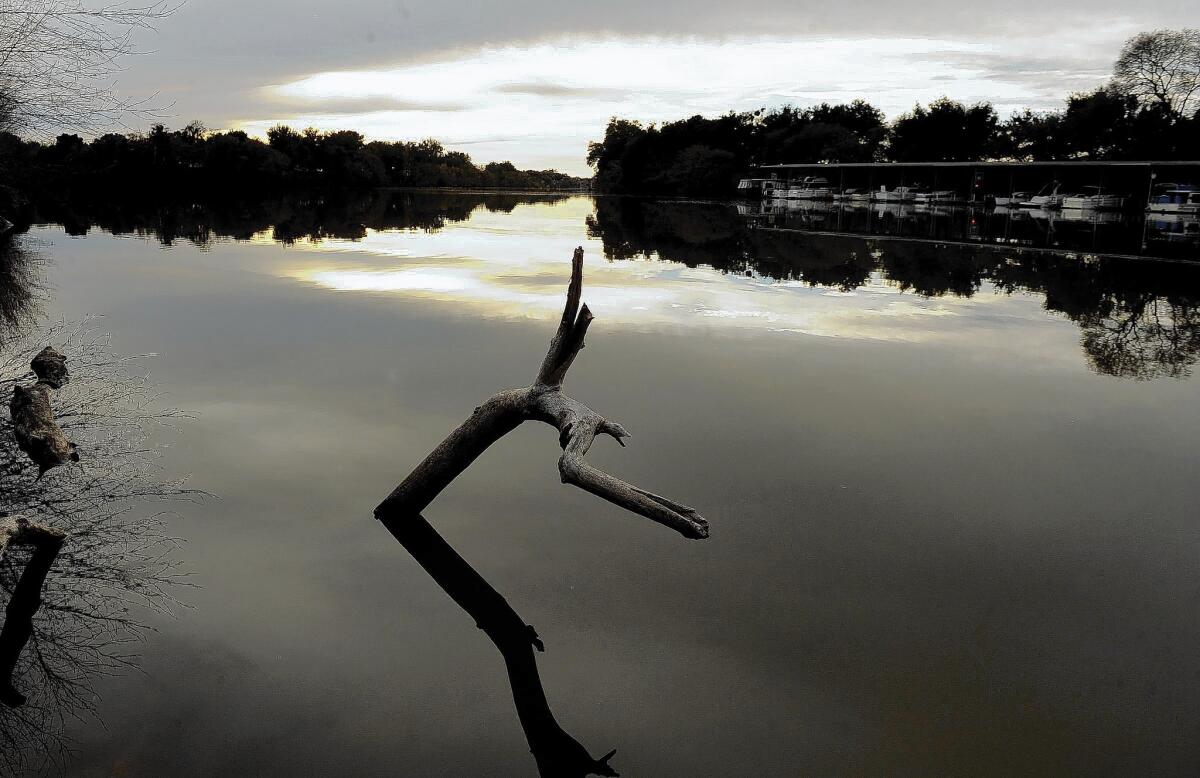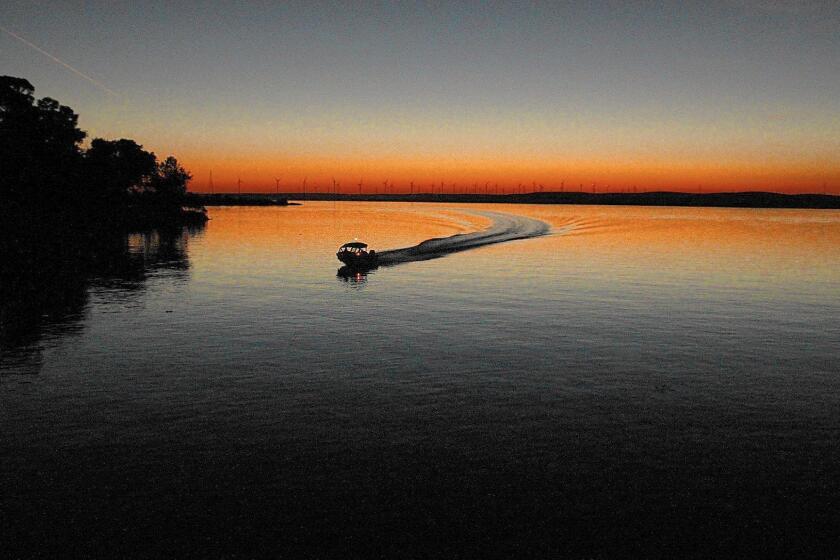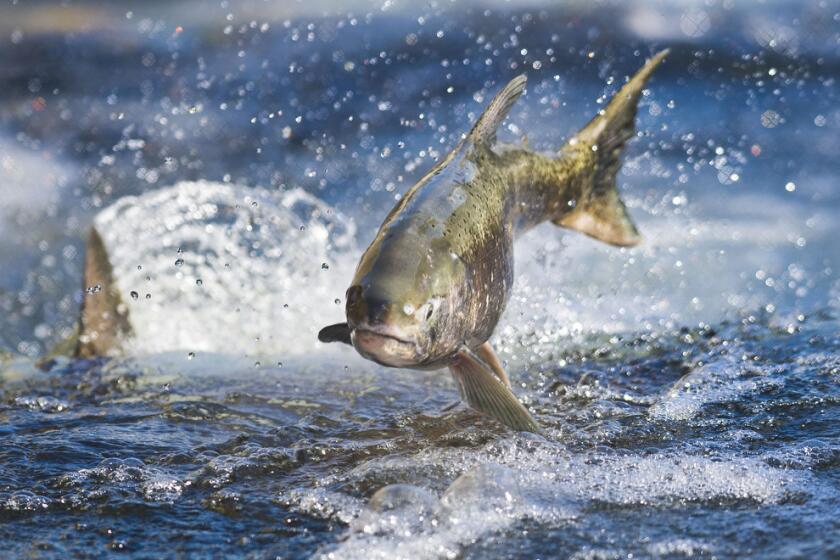Newsom pledged to fix California water politics. Now he’s bogged down in the delta

- Share via
Soon after taking office last year, Gov. Gavin Newsom pledged to break through the “status quo” of California water politics, plagued by decades of litigation and impasse.
“We have to get past the old binaries, like farmers versus environmentalists, or North versus South,” the governor said in his 2019 State of the State address. “Our approach can’t be either/or. It must be yes/and.”
One year later, the Newsom administration appears to be a house divided on water, as competing interests pull it in opposite directions.
The main flash point is the Sacramento-San Joaquin Delta, a threatened estuary and source of water for a majority of Californians. In an unusual public disagreement with a sister agency, the California Fish and Wildlife Department said proposed state rules for pumping water supplies from the delta would worsen conditions for delta smelt and other fish on the brink of extinction.
Newsom has also pledged to stand up to the White House on environmental issues. Yet two months after state officials vowed to sue the Trump administration to block a rollback of federal endangered species protections for imperiled native fish, no lawsuit has been filed.
And the state’s high-profile attempts to negotiate a settlement with major water users over tough new flow requirements for delta tributaries have stalled.
“A lot of people are wondering what’s going on,” said Kim Delfino, California director for Defenders of Wildlife, an environmental group. “It’s a huge mess.”
A California fight over delta water will reveal how far Gov. Gavin Newsom is willing to go as he battles the Trump administration over environmental rollbacks.
In interviews, Natural Resource Agency officials rejected suggestions of internal conflict and disarray.
“I don’t think there’s a divorce, I don’t think there’s a major split,” fish and wildlife director Chuck Bonham said of his department’s polite, but highly critical comments on the Department of Water Resources’ delta pumping proposal.
Rather, he said, two departments with different authorities are working their way through a complicated environmental review process in an unprecedented situation.
The State Water Project, which supplies Southern California with delta water, has historically adhered to federal Endangered Species Act protections for delta smelt, chinook salmon and other imperiled species.
But in the face of the pending Trump rollbacks, the Newsom administration decided to do something California has never done before — develop its own set of delta fish protections under the California Endangered Species Act.
That has set the resources agency down a path strewn with political and practical potholes.
The Metropolitan Water District of Southern California and other state project customers want the administration to go along with the Trump rollback and relax pumping restrictions that have cost them delta deliveries.
But embracing the Trump plans would not be good optics in a state that considers itself a leader of the Trump resistance.
Moreover, in formal comments filed Jan. 6, the fish and wildlife department argued that delta protections need “strengthening, not weakening.” It added that “any diminishment of existing protections could worsen these species conditions.”
The U.S. Bureau of Reclamation has further complicated matters by signaling that its delta pumping operations would not comply with stricter state endangered species rules.
That would create a practical nightmare in the Northern California delta, which serves as the center of the state’s vast water supply system.
Tougher state standards, for example, could mean that federal irrigation customers of the Central Valley Project gain supplies at the expense of Metropolitan and other state customers. On the other hand, if federal pumping violates state protections, California could block the reclamation bureau from using state canals it sometimes needs to deliver supplies to San Joaquin Valley farms.
That scenario has kept state and federal water managers talking.
“I think all the agencies involved are open to finding a way forward to meet their concerns without lawsuits,” said Natural Resources Sec. Wade Crowfoot. “There is a lot of constructive discussion happening on a daily basis between the federal and state agencies on all manner of management questions.”
“We think litigation should be the last resort,” he added. “But if needed, we will pursue that.”
In a delta face-off with the Trump administration, California has some powerful weapons. It controls state pumps that can export more water than the federal facilities. And both reclamation law and the 1992 Central Valley Project Improvement Act dictate that the federal water project meet state water quality standards.
“We’re not powerless. The state has some leverage,” said Jeffrey Mount, a senior fellow at the Public Policy Institute of California. But “nobody benefits from this kind of standoff — I get why the administration hasn’t pulled the trigger on the lawsuit.”
Environmental attorney Doug Obegi doesn’t. Noting that California has filed dozens of lawsuits against Trump policies, Obegi said he is optimistic the state will sue “and that fish and wildlife will stick to its guns.”
“I think fish and wildlife’s letter highlights their consistent and ongoing concerns with weakening protections for salmon and endangered species in the delta. What’s unusual is that this dispute between the state agencies has seen the light of day,” said Obegi, a senior attorney with the Natural Resources Defense Council.
To operate delta exports under the state Endangered Species Act, the water resources department must obtain a permit from fish and wildlife, which appears to be scoring some points.
In draft environmental documents released in November, the water resources department estimated that its proposed pumping rules would boost the State Water Project’s annual delta exports by an average of roughly 200,000 acre feet — enough to supply 400,000 households for a year.
But the department’s December permit application outlined a less aggressive pumping approach. Water resources “considered the feedback from parties, including fish and wildlife, and have come back with a permit application … that commits to no net increase in exports,” Crowfoot said.
More changes are possible before fish and wildlife issues the permit this spring, said water resources director Karla Nemeth.
“I don’t think DWR was surprised by the fish and wildlife comments … because those are all the issues we’re talking about,” she said. “There’s more work to do and we expect to keep going.”
A 1,223-page document, obtained by The Times, details how endangered California salmon could be imperiled by Trump administration changes to state water operations.
Fish and wildlife biologists also rejected a premise of the Trump rollback and the initial water resources proposal. Both would rely on real-time monitoring of where imperiled fish are swimming in the delta to dictate pumping levels instead of the strict seasonal guidelines that have been in place for the past decade.
Given that the numbers of delta smelt and longfin smelt have plummeted to record lows in recent years, fish and wildlife said such an approach could create “a bias toward concluding that fish are not in the system when, in fact, they are.”
In a separate but related matter, the Newsom administration has been trying to negotiate a settlement with major water users to avert a legal war over new flow standards that would make cities and farms leave more water in delta tributaries — and eventually the delta — to support migrating salmon.
Major river users upstream of the delta have already filed a slew of lawsuits to block the first set of flow standards, which were adopted by the State Water Resources Control Board in late 2018.
Westlands Water District, California’s biggest irrigation agency, walked away from the settlement talks after the state declared it would sue to stop the federal rollbacks in the delta.
Crowfoot said his agency would soon release an assessment of whether proposed settlement terms would satisfy the water board’s environmental standards.
Jeffrey Kightlinger, general manager of the Metropolitan water district, said his agency is still involved in the flow talks, but is unsure of the outcome.
The governor’s office, he observed, is “trying to strike a balance — and that’s very hard with these thorny issues.”
“I’ve seen them be pretty realistic that, ‘Yes, we’re going to have a lot of unhappy people.’ ”









